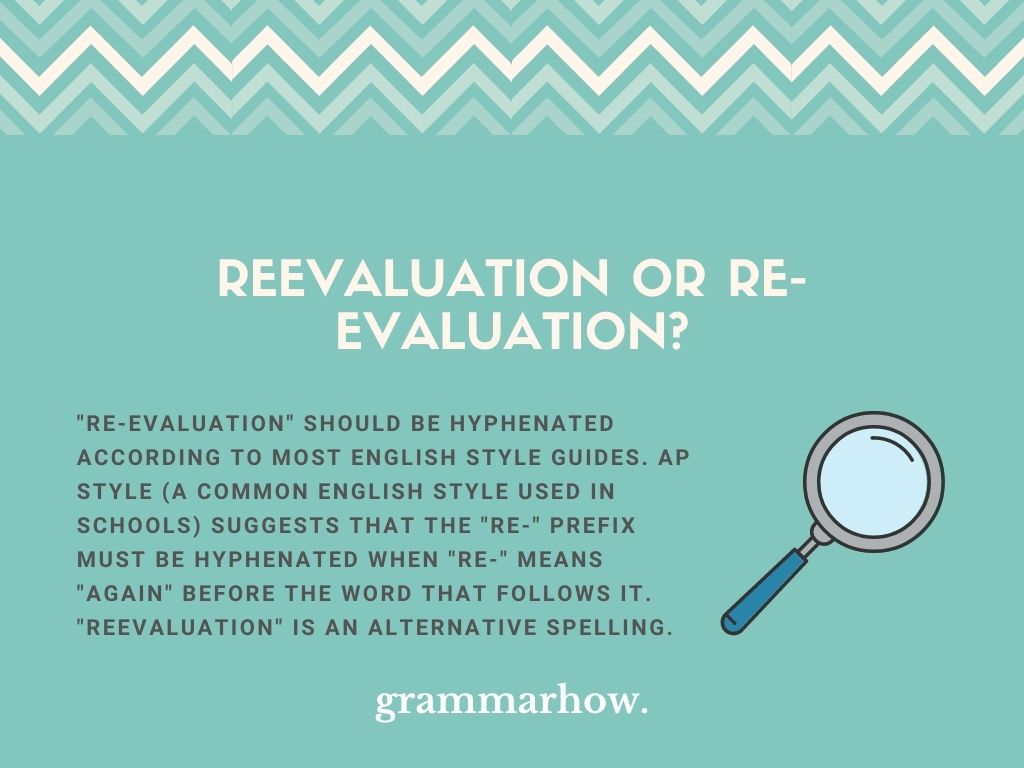Sometimes, you can use a hyphen to group two words together. Other times, you might find that a hyphen is used when a prefix like “re-” comes before a word. It would help to know why this applies with a word like “re-evaluation.” This article will explain everything.
Reevaluation or Re-evaluation?
“Re-evaluation” should be hyphenated according to most English style guides. AP Style (a common English style used in schools) suggests that the “re-” prefix must be hyphenated when “re-” means “again” before the word that follows it. “Reevaluation” is an alternative spelling.

Generally speaking, you should keep the hyphen as part of the word. AP Style makes it clear that “re-” should be kept separate from the root word with a hyphen to make sure it keeps the “again” meaning.
Without a hyphen, “re-” doesn’t always mean “again.” For example, the word “recover” does not mean “cover again,” but the “re-” prefix is still used.
If you leave the hyphen out of the word, more often than not, you’re going to confuse the reader because it can be similar to another word.
For example:
- Reevaluation
- Revaluation
Here, “reevaluation” can be confused with “revaluation” when the hyphen is not included. The double “E” looks more like a typo, and many people will be confused as to why you wrote it like that.
Reevaluation
“Reevaluation” is correct, but it does not follow official English rules when writing hyphens. You should include a hyphen after the “re-” prefix whenever it helps you to establish a key difference between it and a different word.
The word that might cause confusion here is “revaluation.”
“Revaluation” means to “value something again.”
“Re-evaluation” means to “evaluate something again.”
The two words are not the same, but when the hyphen isn’t included, they look almost identical.
Most “re-” prefix words are hyphenated when “re-” means “again” and when another word is similar to it, which could lead to confusion. That’s why “reevaluation” is usually not appropriate.
Still, here are some examples to see how to use “reevaluation” in a sentence:
- I’m going to need to go through the reevaluation process to make sure I know what to expect here.
- Make yourself ready for reevaluation. I know it’s annoying, but we have got to make sure we’re on the same page.
- Reevaluation is important. You need to go through the process to make sure you’re still up to par with the skill level.
- I thought this was supposed to be a reevaluation. It seems like you’re taking way too long to figure this out.
Re-evaluation
“Re-evaluation” is the correct way of writing this word. The hyphen helps to separate the “re-” prefix from the root word “evaluation.” It shows that something will be “evaluated again.”
The hyphen is important to help you make the word clearer. When the hyphen is used, there is no ambiguity, and it does not look like a misspelling of “revaluation.”
Here are some examples to show you how to use “re-evaluation” in a sentence:
- It’s not just about the re-evaluation. Other things are supposed to go into this.
- I want the re-evaluation to go well, which is why I dedicated so much time and effort to the problem.
- It’s going to come after the re-evaluation. As long as we do well, we should be able to get the reward.
- She wanted to do a re-evaluation to see if anything had changed. I suppose we’ll wait and see what she says.
Re-evaluation or Re-Evaluation?
Sometimes, you will find that both parts of a hyphenated word are capitalized. This is fairly uncommon, but you need to know when it applies.
“Re-evaluation” is correct if you start a sentence with the word. You treat the hyphenated form as one word, so “evaluation” stays in the lower case. “Re-Evaluation” is correct if you include it in a title. Hyphenated words usually have both parts capitalized in a title.
Different title styles usually say different things. Generally, though, if every other word in your title is a capital letter, you should also capitalize both parts of “re-evaluation.”
Final Thoughts
“Re-evaluation” is the correct form that you should use. Including the hyphen allows you to use the word correctly without worrying about getting it confused with “revaluation” (which has a completely different meaning). “Reevaluation” can work, but it is better to hyphenate.

Martin holds a Master’s degree in Finance and International Business. He has six years of experience in professional communication with clients, executives, and colleagues. Furthermore, he has teaching experience from Aarhus University. Martin has been featured as an expert in communication and teaching on Forbes and Shopify. Read more about Martin here.
